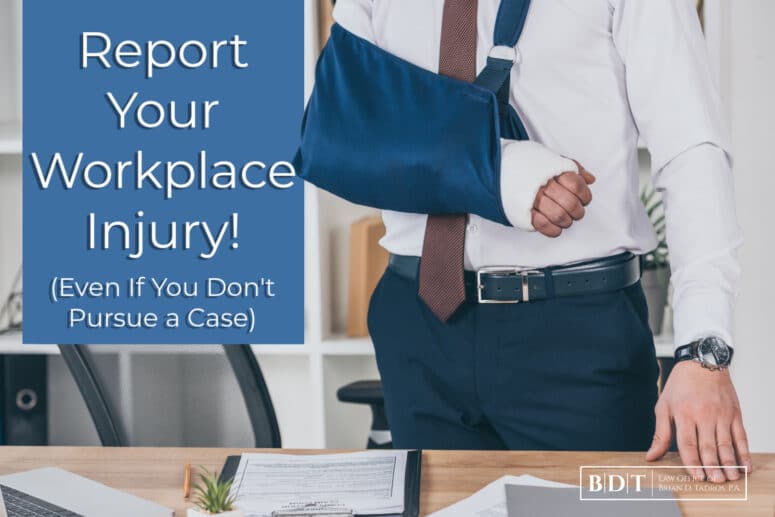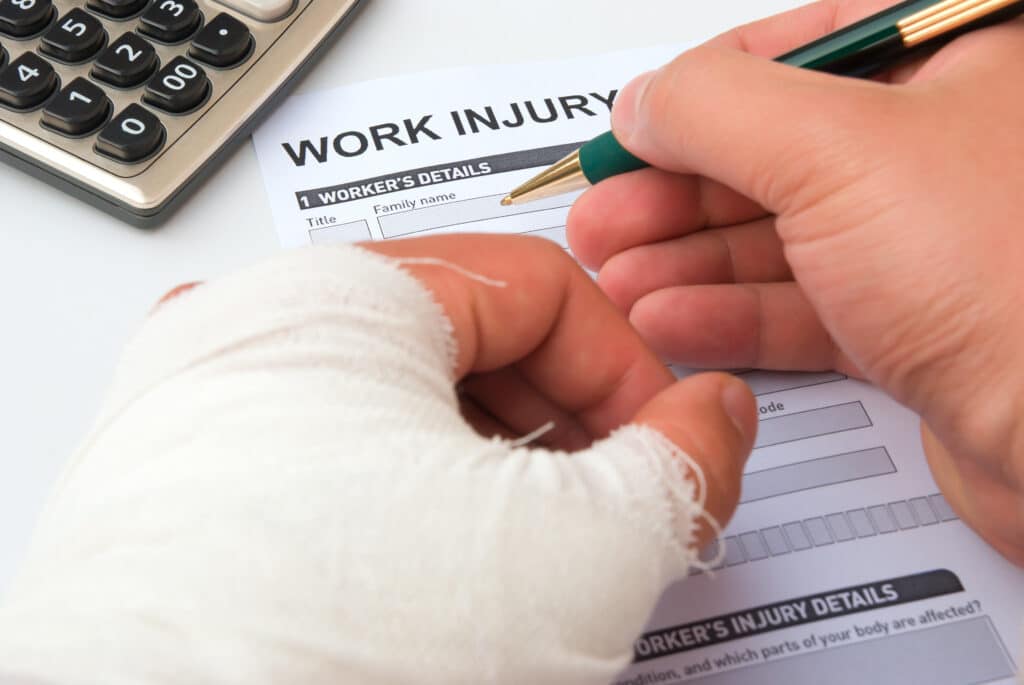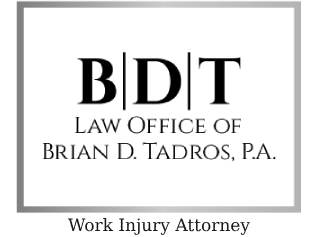
You’re probably going to be fine…
But here’s why you should report your workplace injury anyway.
No matter where you work or what industry you work in, workplace injuries are more common than you think.
People slip and fall, machinery malfunctions, doors swing open, and more. In fact, some of the most benign occurrences—like electric shocks and carpal tunnel syndrome—are among the most common work-related injuries and don’t always happen in manual labor industries.
When an injury seems small and inconsequential, it feels natural to go about your business without reporting it. After all, no one wants to enter a legal battle with their employer.
But reporting your injury isn’t only about pursuing a claim. It’s about protecting yourself, your peers, and your employer from future accidents or lawsuits.
Read on as we discuss why.
Injured at Work In Florida?
Reporting a Workplace Injury Does Not Have To Be a Litigious Action

Some employees might worry that reporting a minor injury—or any injury—will seem aggressive to their employers, and they might fear retribution for doing so.
Rest assured that reporting a workplace injury is never the wrong thing to do, and you can make it clear that your actions are not litigious. Most forms have a “notification only” option which indicates that you are not seeking compensation or pursuing legal action at this time.
Reporting your injury merely creates a paper trail for what has happened and creates a more transparent and honest work environment.
Reporting a Workplace Injury Protects You and Others In the Long Run
Your injury may seem minor initially, but cuts can become infected, minor muscle strains can cause significant problems months down the road, and repetitive injuries can start to pile up quickly.
Even if you do not intend to pursue a worker’s compensation claim for your injury and do not anticipate missing work in the near future, reporting your injury protects you in the event of future health issues.
If you were to mildly strain your back lifting boxes at work, you might need to seek medical treatment for it months down the line. If you do not report this injury when it initially happens, your employer may refuse to provide any medical treatment or out-of-work benefits should it come to that.
Failing to report an injury also opens the door for the insurance company to deny that it happened at work or was explicitly caused by your work duties.
Reporting your injury protects you as much as it protects your peers. If you were injured by faulty equipment, you are alerting your team to possible danger, thereby protecting them and your employer from further injuries and claims.
Whether or not you plan to pursue a claim regarding a workplace injury, it is always wise to report it. You’re protecting yourself in the event of further damage and protecting your peers from suffering a similar injury.
When and How to Report Your Workplace Injury

The first concern if you are injured on the job is to assess whether immediate medical attention is needed, either by calling 911 or going to an urgent care facility. If that is not required, any necessary first aid or medical treatment should be administered as soon as possible.
Once your injury has been properly cared for, your injury should immediately be documented and adequately reported. In the state of Florida, you should report your injury as soon as possible after it happens, but you have at most 30 days from the occurrence to do so.
It is best practice not to wait to report your injury and to do so before picking back up with your work. If you eventually do need to file a claim for workers’ compensation, quick reporting will show how seriously you took this incident.
When reporting your injury, be specific about what led to the incident. Include any mitigating circumstances, such as loose carpeting or bad lighting, as well as witness statements from your peers to corroborate your story. Be sure not to embellish any details because that can hurt you if you do end up filing a claim.
Reporting a workplace injury is, first and foremost, about honesty and transparency as well as protection and prevention.
Once you’ve filed your report, reiterate whether you want to make a claim at the present time or not so your employer knows what their next step should be as well. You should also leave a paper trail throughout the claim process, in the event it comes in handy later.
Contact the Law Office of Brian D. Tadros for Workplace Injury Questions
A workplace injury, no matter how small, is an unsettling incident. You want to act in your best interests, but sometimes you might not know what those are.
You can always be sure that reporting a workplace injury is always the right decision, no matter how small and whether or not you intend to pursue a claim. You’re protecting yourself no matter what the future holds.
If you ever have questions about workplace injuries or you’ve decided to file a claim, the Law Office of Brian D. Tadros is here for you. We’ll ensure you know what’s going on at all times, and we will advocate for you.
Contact us today to get your work injury questions answered.

